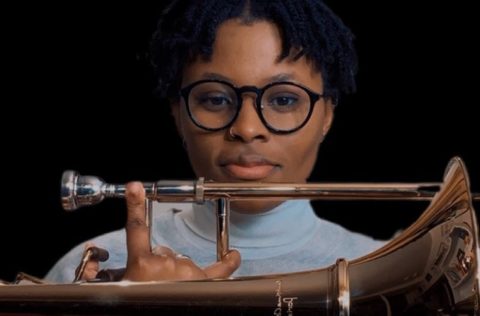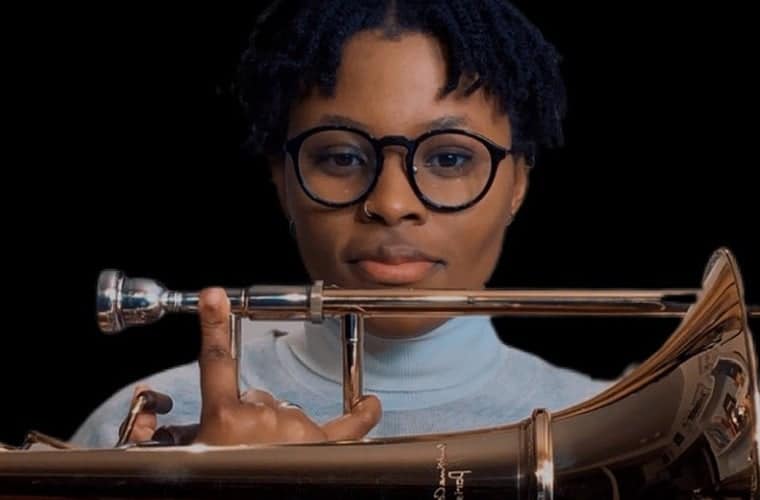For this month’s mentor feature, Student Navigator Emory Freeman had the pleasure of interviewing the newly appointed second trombonist of the Michigan Opera Theatre, Robyn Smith. Robyn recently graduated with a Master of Music from the New England Conservatory studying under the tutelage of Toby Oft, principal trombone of the Boston Symphony. In her most recent engagements, Robyn performed at the Tanglewood Music Center as a fellow and has previously performed with the New World Symphony, National Repertory Orchestra, American Repertory Theatre, and with the artist Lizzo at the 62nd Annual Grammy Awards. She performs with a variety of ensembles and is an associate artist with the Rodney Marsalis Big Brass.

Robyn Smith
Robyn’s solo work includes a performance at Michigan State University’s MLK tribute concert and as a featured soloist on New England Conservatory’s Contemporary Ensemble concert. Her awards extend internationally, as she was the winner of the 2018 International Trombone Association’s Marsteller Solo Competition. Robyn is an advocate for the dismantling of oppressive structures that contribute to the lack of black and brown faces within high art forms.
Robyn is a mentor with CMPI. She continues to feel fulfilled being a mentor and wants to give back to CMPI through her supportive role with our CMPI fellows. In my conversation with Robyn, here is how it went:
So, tell me about yourself!
I am originally from Atlanta, Georgia. I grew up in the city schools, and joined the Talent Development Program where I got to study with musicians in the Atlanta Symphony. I went to the New England Conservatory for my undergraduate degree, and I ended up staying there for my Master’s degree. I just finished up grad school last year in 2021.
In the Talent Development Program, did they have mentors?
When I was in the program, we did not. We had alumni come in and speak to us. I think TDP is implementing something with mentorship currently.
As you got involved with the Detroit Opera, how did you get involved with mentoring in CMPI?
Halfway through my Master’s degree, I won the position. Right after that was when COVID started. For this season, I have not been able to play with them much because of COVID. I reached out to Adrienne and did a workshop with CMPI, and Adrienne said that if I moved to Chicago, I can be a mentor for CMPI. So, I came to Chicago. I started up with teaching, and then started mentoring with CMPI along with other things. When I have to go to work in Detroit, I will travel there.
What do you enjoy the most about the program?
It is really nice to be a part of a young “Robyn’s” journey. I love to think about the things I went through, and the things I needed at the time I was growing up. It’s fulfilling, and whatever I can do to help, contribute, and give back, it is everything to me.
Who were your mentors growing up? How does that influence how you mentor fellows in CMPI?
I found my first mentor when I auditioned for college. Although TDP did not have mentors, other TDP alumni and families would be invited back to talk about their experiences. While that was not a specific mentorship, that sort of constant validation was good in my journey. When I auditioned for college, I auditioned at The New School where Weston Sprott teaches. That was my first time seeing a black teacher at a major school. After my audition he said, “I don’t care if you come to this school or not, but I want you to know that I am in your corner. And I’d like to be your mentor.” From that point on is when I had a mentor, and I was able to reach out to him while in school about various situations. Even to this day, I can still text him and he’ll give me advice.
Why do you think mentoring is important?
Mentoring is important because everyone needs it, especially minorities in this field. It feels isolating and lonely, and you start to doubt yourself. It is helpful to have someone as a guide and in your corner that you can feel like you can achieve your biggest goals. It is hard to feel like you can do things and not have support, or no village.
If you could give advice to yourself, what would that be?
Use resources and stay true to yourself. There are a lot of different paths that people project onto you, especially being a classical musician. What is most beneficial is knowing what you want and what makes you feel fulfilled at the end of the day. Continue to use the resources that are around you so that you are able to make decisions.
What would you want people to know about you? Anything else you wanted to add about you as a mentor, inspirational quote?
I have always been the type of person who enjoys doing multiple things at once. I am an orchestral musician, but I enjoy playing all kinds of music. It is quite rewarding to play solos, chamber music, jazz, and pop. I also find it rewarding to pick up anything that reminds me of why I love music. Once you get into the orchestral path, people think “well you have to do that,” or “that is the only thing you can do, and if you don’t do that, it makes you less of an orchestral musician.” I just like people to know that I enjoy other music too, and I like to be just as good with orchestral music as I am with any other type of music.
Images
Robyn Smith headshot
